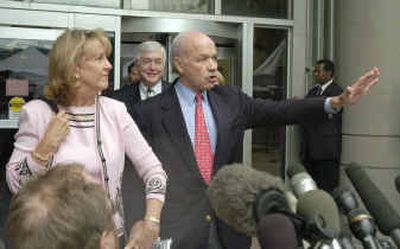Lay claims innocence

WASHINGTON — Federal prosecutors will need much more than the word of Andrew Fastow to convince a jury to convict former Enron Corp. chief Kenneth Lay of participating in an audacious scheme to deceive the government and investors of the failed energy company, private attorneys say. Lay, who founded Enron in 1985, insists he was kept in the dark by Fastow, the former chief financial officer who pleaded guilty in January to orchestrating partnerships and financial ruses to conceal Enron’s massive debt and inflate profits while pocketing millions for himself. “I did not know what he (Fastow) was doing. He didn’t share with me what he was doing,” Lay told reporters Thursday outside the federal courthouse in Houston where he pleaded innocent to 11 criminal counts including conspiracy, securities fraud and bank fraud. For the government, making the case against Lay hinges heavily on providing corroboration in documents or witness testimony to what Fastow likely will say at trial, according to Andrew McBride, a former federal prosecutor now in private law practice. “That’s the way to win that case,” he said. “If it’s Fastow alone, the government loses.” Lay’s side will try to impugn Fastow’s credibility as someone who cut a deal and would say anything to shorten his prison term — and the jury may buy it, McBride suggested. Already on Thursday, one of Lay’s attorneys called Fastow “obviously a liar and a thief.” Unlike former president and CEO Jeffrey Skilling and ex-top accountant Richard Causey, Lay wasn’t required to sign off on the byzantine deals and partnerships that Fastow hatched. The government wants to try the three together, but Lay’s legal team is pushing for him to stand trial alone ahead of Skilling and Causey. It will be “very, very tough” for Lay to get a separate trial, because a conspiracy is being alleged, said Ronald Allen, a professor of criminal law at Northwestern University in Chicago. And Frederic S. Fox, a trial lawyer in New York, added that the prosecutors want a trial of the trio “so the jury would see the whole picture” from that perspective. In the indictment released on Thursday and an accompanying civil complaint from the Securities and Exchange Commission, the government asserts that there is ample evidence to tie Lay to the company’s collapse. “Mr. Lay is being charged, not for where he sat, but for what he did. Mr. Lay is today a defendant not because he was a disengaged figurehead, but rather because he was an all-too-engaged participant in the fraud that was Enron,” said Linda Thomsen, deputy enforcement director of the SEC. Deputy Attorney General James Comey said in Washington on Thursday that “there’s a presumption, as I think most of you know, in the federal system for joint trials. Those who are indicted together are tried together. That’s not always the case, but in most circumstances. And we would expect that will be a joint trial here.” At the trial, Lay “is going to portray himself as as much a victim of this fraud” as any hapless Enron employee or shareholder, said Robert A. Mintz, a former Justice prosecutor and expert on white-collar crime. Lay will paint himself as “more glad-hander than bookkeeper,” he said. Once worth about $400 million, Lay says he has been wiped out by Enron’s collapse and pegs his current net worth at less than $20 million. Sherron Watkins, the Enron accounting executive who warned Lay in the summer of 2001 that the company’s financial house of cards was set to collapse, has drawn a distinction between the roles of Lay and Skilling, his hand-picked protege. Watkins testified to Congress in 2002 that she believed that Fastow and Skilling “did dupe Ken Lay and the board.” Contrasting with other recent high-profile corporate cases, the government’s case against Lay does not accuse him of personally profiting from a conspiracy within the company. Former Tyco International chief executive L. Dennis Kozlowski, for example, was accused of looting the company of hundreds of millions.